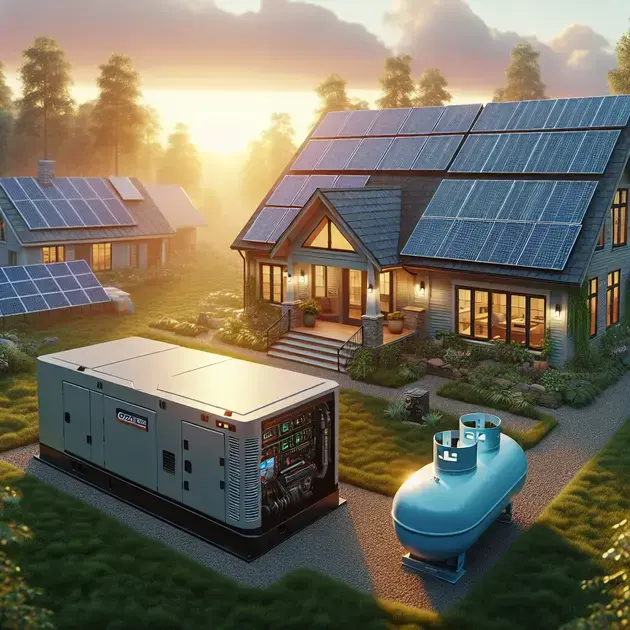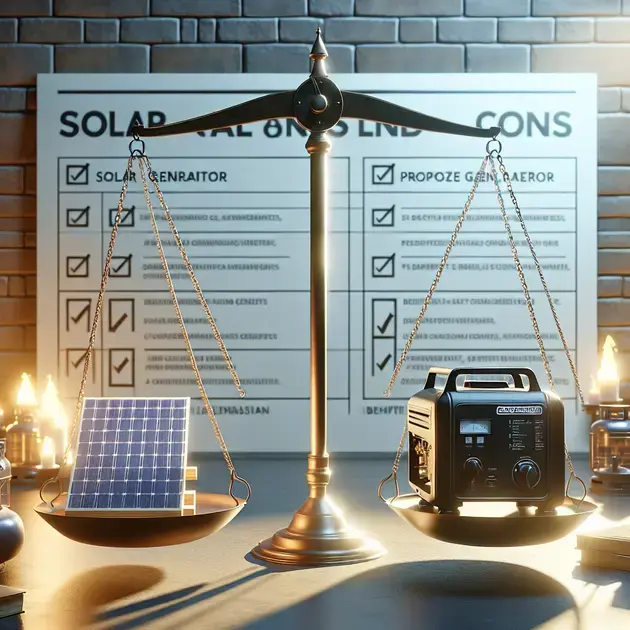When it comes to ensuring your home is always powered, having a reliable generator is crucial. In this comprehensive guide, we will explore the ultimate house generator options available to you. From portable generators to standby models, we will discuss the pros and cons of each to help you make an informed decision for your specific needs.
In recent years, advancements in generator technology have brought about more efficient and eco-friendly options. Solar-powered generators are becoming increasingly popular for homeowners looking to reduce their carbon footprint while ensuring a continuous power supply. For those seeking a low-maintenance solution, propane generators offer a reliable alternative with longer shelf life compared to gasoline.
Exploring Portable Generator Pros and Cons
When considering purchasing a portable generator, it’s essential to weigh the pros and cons to make an informed decision. Let’s delve into the advantages and disadvantages of portable generators to help you understand their functionality better.
Pros:
1. Portability: Portable generators are designed to be easily moved from one location to another, making them ideal for outdoor activities such as camping or construction sites.
2. Emergency Power Source: In case of a power outage, a portable generator can provide backup power to keep crucial appliances running.
3. Variety of Sizes: Portable generators come in different sizes, from small units suitable for charging electronics to larger units capable of powering entire homes.
4. Cost-Effective: Portable generators are typically more affordable than standby generators, making them a budget-friendly option for temporary power needs.
5. Easy to Use: Most portable generators are user-friendly, with simple controls and easy maintenance requirements.
Cons:
1. Limited Power Output: Portable generators have lower power output compared to standby generators, which may not be sufficient for powering all devices simultaneously.
2. Fuel Dependence: Portable generators rely on fuel, such as gasoline or propane, which must be refilled regularly to keep the generator running.
3. Noise Levels: Portable generators can be noisy during operation, which may not be suitable for environments where noise pollution is a concern.
4. Maintenance Requirements: Regular maintenance, such as oil changes and filter replacements, is necessary to keep a portable generator in optimal condition.
5. Limited Run Time: Portable generators have a limited run time based on their fuel capacity, requiring periodic refueling for extended use.
Standby Generators: A Comprehensive Overview
Understanding standby generators is crucial for homeowners looking to invest in a reliable backup power solution. Let’s explore a comprehensive overview of standby generators to help you make an informed decision for your property.
Types of Standby Generators:
1. Air-Cooled Standby Generators: These generators are suitable for smaller power needs and operate using air to cool the engine during operation.
2. Liquid-Cooled Standby Generators: Designed for larger power requirements, liquid-cooled generators use coolant to maintain optimal engine temperature.
3. Automatic Standby Generators: These generators are equipped with an automatic transfer switch that detects power outages and starts the generator without manual intervention.
4. Manual Standby Generators: Manual standby generators require manual activation during a power outage, making them suitable for occasional use.
5. Whole-House Standby Generators: These generators are capable of powering an entire house, providing seamless backup power during extended outages.
Installation Process:
1. Consultation: Begin by consulting with a professional generator installer to assess your power needs and determine the best standby generator size for your home.
2. Permits and Regulations: Obtain necessary permits and ensure compliance with local regulations before installing a standby generator on your property.
3. Site Preparation: Prepare a suitable location for the standby generator, ensuring proper ventilation and sufficient clearance for maintenance tasks.
4. Professional Installation: Hire a certified electrician or generator technician to install the standby generator according to manufacturer specifications for optimal performance.
5. Testing and Maintenance: Once installed, regular testing and maintenance are essential to ensure the standby generator functions correctly during power outages.
Solar vs. Propane Generators: Making the Right Choice
Choosing between solar and propane generators involves evaluating their unique features and capabilities to determine the best option for your energy needs. Let’s compare solar and propane generators to help you make an informed decision.
Solar Generators:
1. Renewable Energy Source: Solar generators harness energy from the sun, providing a sustainable and eco-friendly power solution.
2. Low Maintenance: Solar generators have minimal maintenance requirements compared to traditional fuel-based generators, reducing long-term operating costs.
3. Quiet Operation: Solar generators operate silently, making them ideal for residential areas or locations sensitive to noise pollution.
4. Off-Grid Capability: Solar generators can operate off-grid, making them suitable for remote locations or emergency situations when traditional power sources are unavailable.
5. Initial Investment: While solar generators have a higher upfront cost, they offer long-term savings on energy bills and reduce reliance on fossil fuels.
Propane Generators:
1. Fuel Availability: Propane generators use readily available propane gas, ensuring a constant fuel supply during power outages or emergencies.
2. High Energy Density: Propane has a higher energy density compared to gasoline or diesel, providing efficient power output for extended periods.
3. Versatile Fuel Usage: Propane can be stored for long periods without degradation, making it a reliable fuel source for backup power generation.
4. Cold Weather Performance: Propane generators perform well in cold weather conditions, making them suitable for regions with harsh winters.
5. Easy Maintenance: Propane generators are easy to maintain, with fewer components prone to wear and tear, ensuring consistent performance over time.
Choosing the Best Fuel Type for Your Generator
Choosing the best fuel type for your generator is a crucial decision that can impact the performance and longevity of your equipment. There are several options available, including gasoline, diesel, propane, and natural gas. Each fuel type has its pros and cons, so it’s essential to consider various factors before making your choice.
Gasoline is a popular choice for portable generators due to its availability and ease of use. However, gasoline has a shorter shelf life compared to other fuel types, which can lead to issues with fuel degradation if not used promptly. Diesel, on the other hand, is more efficient and offers better fuel economy, making it a preferred choice for larger generators.
Propane is a clean-burning fuel that is stored in tanks and is less prone to deterioration over time. It is also safer to store than gasoline or diesel. Natural gas is a convenient option for homeowners with access to a natural gas line, as it eliminates the need for refueling. However, natural gas generators may be more expensive upfront.
In conclusion, when choosing the best fuel type for your generator, consider factors such as availability, shelf life, efficiency, cost, and convenience. It’s crucial to select a fuel type that aligns with your specific needs and usage requirements to ensure optimal performance and reliability.
Maintenance Tips for Long-lasting Generator Performance
Maintaining your generator is essential for ensuring long-lasting performance and reliability. Regular maintenance can help prevent breakdowns, extend the lifespan of your equipment, and save you money on costly repairs. Here are some maintenance tips to help keep your generator in top condition:
Regular Inspection
Perform regular visual inspections of your generator to check for any signs of damage, leaks, or corrosion. Inspect the fuel system, oil levels, filters, and spark plugs regularly to ensure everything is in working order.
Oil and Filter Changes
Regularly change the oil and filters in your generator as per the manufacturer’s recommendations. Clean oil and filters help the engine run smoothly and efficiently, reducing wear and tear on the internal components.
Run the Generator
It’s essential to run your generator regularly to keep it in good working condition. Regularly starting and running the generator helps prevent fuel system problems and keeps the engine lubricated.
Keep It Clean
Keep your generator clean from dirt, dust, and debris that can clog the air filters and hinder performance. Regularly clean the exterior of the generator and ensure proper ventilation around the unit.
Professional Servicing
Consider scheduling professional servicing for your generator at least once a year. A qualified technician can perform thorough maintenance checks and address any issues before they escalate, ensuring your generator stays in peak condition.
Factors to Consider Before Investing in a Home Generator
Investing in a home generator is a significant decision that requires careful consideration of various factors to ensure you select the right unit for your needs. Before making a purchase, take the following factors into account:
Power Requirements
Determine your home’s power requirements to assess the size and type of generator you need. Consider essential appliances, lighting, heating, and cooling systems that you want to power during an outage to calculate the required wattage.
Fuel Type
Choose a fuel type that aligns with your preferences and availability in your area. Consider factors such as fuel cost, storage requirements, and shelf life when selecting between gasoline, diesel, propane, or natural gas.
Installation and Location
Decide on the installation location for your home generator, considering factors such as proximity to your electrical panel, ventilation requirements, and local regulations. Proper installation is crucial for safety and optimal performance.
Budget and Cost
Set a budget for your home generator purchase, including installation costs and any necessary accessories. Compare prices and features of different generator models to find one that fits within your budget while meeting your power needs.
Brand and Warranty
Research reputable generator brands with a history of quality and reliability. Check the warranty coverage offered by the manufacturer to ensure your investment is protected in case of any defects or issues with the unit.
Conclusion
Choosing the best fuel type for your generator plays a pivotal role in its overall performance and durability. Gasoline, diesel, propane, and natural gas each have their advantages and drawbacks, so it’s crucial to assess factors like availability, shelf life, efficiency, cost, and convenience before making a decision. While gasoline is popular for portability, diesel offers better fuel economy, propane is cleaner and long-lasting, and natural gas provides a hassle-free refueling experience.
Maintenance of your generator is vital to ensuring its longevity and efficiency. Regular visual inspections, oil and filter changes, running the generator periodically, keeping it clean, and scheduling professional servicing help prevent breakdowns and maintain peak performance. These maintenance tips are essential for avoiding costly repairs and maximizing the lifespan of your generator.
Investing in a home generator requires careful consideration of power requirements, fuel type, installation location, budget, and the brand’s reliability. Determining the wattage needed, selecting the right fuel type based on cost and availability, ensuring proper installation and ventilation, budgeting for the purchase and accessories, and choosing a reputable brand with a solid warranty are essential factors to consider. By taking these factors into account, you can make an informed decision and ensure your home is prepared for any power outages.

